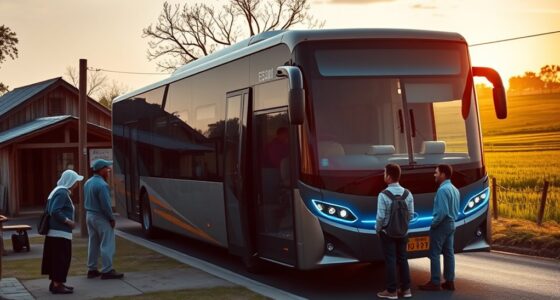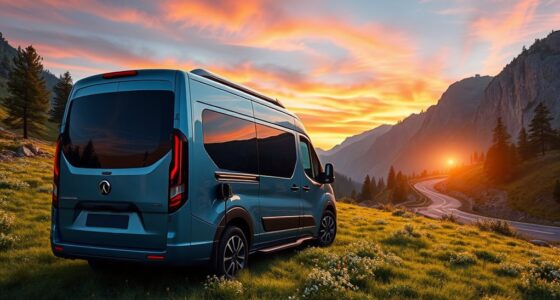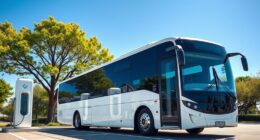Driving a VW Bus in winter can be a chilling experience, but with the right preparations, it can also be memorable. Equip your vehicle with high-quality snow tires and a reliable engine heater for better grip and warmth. Reduce speed, keep emergency supplies handy, and stay alert to icy patches like black ice. Proper maintenance guarantees smooth winter drives, turning cold days into cozy road trips. Keep exploring to discover more tips for safe winter adventures in your VW Bus.
Key Takeaways
- Equip your VW Bus with high-quality snow tires for better grip and safety on icy winter roads.
- Install an engine block heater to ensure quick starts and smooth operation in freezing temperatures.
- Keep windshield washer fluid winter formula and maintain wipers for clear visibility in snowy conditions.
- Drive cautiously by reducing speed, increasing braking distance, and watching for black ice on winter routes.
- Pack an emergency kit with blankets, snacks, and safety tools to stay prepared during winter travel adventures.

Driving a VW Bus in winter can be a rewarding experience if you’re prepared for the challenges that cold weather brings. One of the most essential steps you can take is equipping your bus with snow tires. These tires provide better grip and control on icy or snow-covered roads, giving you confidence behind the wheel. Don’t skimp on quality—invest in good snow tires that are suitable for winter conditions, as they substantially reduce the risk of slipping or skidding. Remember to check the tire pressure regularly; cold temperatures tend to lower pressure, which can diminish tire performance and fuel efficiency. With proper snow tires, you’ll notice improved traction, making those winter drives safer and less stressful.
Equipping your VW Bus with quality snow tires enhances safety and control during winter drives.
Alongside snow tires, engine heating becomes vital in colder months. Unlike regular engines, a VW Bus with a reliable engine heating system warms up faster and maintains ideal operating temperature despite the freezing weather. Starting your bus with a pre-heated engine minimizes wear and tear, ensuring it runs smoothly throughout your winter adventures. If your bus doesn’t have an integrated engine heater, consider installing one or using an engine block heater. These devices keep the engine warm overnight, so you’re not waiting in the cold for it to warm up each morning. This not only saves time but also prevents engine strain and potential cold-start issues. Additionally, maintaining proper antifreeze levels and checking your coolant mixture ensures your engine remains protected against freezing temperatures. Incorporating regular maintenance routines can further enhance your vehicle’s winter performance.
When driving in winter, it’s essential to be mindful of road conditions. Even with snow tires and engine heating, you should reduce your speed and allow for greater braking distances. Cold weather can cause black ice, which is hard to spot but very slippery. Maintain a steady, gentle acceleration and avoid sudden turns or braking to prevent skidding. Keep an emergency kit in your VW Bus, including blankets, a flashlight, and some non-perishable snacks, in case you get stuck or stranded. Also, ensure your windshield wipers are in good condition and keep your windshield washer fluid topped up with a winter formula to prevent freezing and maintain visibility.
Ultimately, driving your VW Bus in winter demands preparation, patience, and awareness. With the right snow tires and engine heating solutions, you can navigate winter roads more confidently. Embrace the cold season’s beauty and memories, knowing you’re equipped to handle its challenges. A well-prepared VW Bus can turn winter driving from a chore into a cozy, adventurous journey, allowing you to enjoy the season’s crisp air and scenic views without worry.
Frequently Asked Questions
How Do I Prevent My VW Bus Windows From Fogging Up?
To prevent your VW bus windows from fogging up, you should use effective defogging techniques like activating your AC or defrost setting, which helps dry the air. Additionally, improve window insulation by sealing any leaks and using anti-fog sprays or treatments. Keeping the interior dry and maintaining good ventilation also reduces humidity, making your windows clearer and safer to drive through winter conditions.
What Winter Tires Are Best for a VW Bus?
You want the best winter tires for your VW Bus to guarantee ideal winter traction and tire durability. Look for tires specifically designed for snow and ice, offering deep treads and enhanced grip. Brands like Michelin, Bridgestone, and Nokian excel in providing reliable winter traction and durability. Choosing the right tires helps you stay safe, improves handling, and prevents slipping, making winter driving much more manageable and secure.
How Can I Maintain Battery Life in Cold Weather?
To maintain battery life in cold weather, you should focus on battery preservation and cold weather charging techniques. Keep your battery fully charged before cold snaps, as a charged battery performs better in low temperatures. Use a battery warmer if possible, and avoid short trips that can drain power quickly. Regularly check your battery’s health, clean terminals, and ensure your charging system is working efficiently to prevent unexpected failures.
Is It Safe to Drive a VW Bus in Snow and Ice?
You might worry about winter driving safety, but with proper precautions, your VW Bus can handle snow and ice. Drive slowly, maintain extra distance, and make sure your tires are winter-ready. Use chains if needed, and keep your fuel tank full to prevent freezing. Remember, winter driving can be safe if you stay alert and prepared. Your vehicle can navigate winter roads confidently, creating warm memories despite the chilly conditions.
What Emergency Supplies Should I Carry in Winter?
When preparing for winter driving, you should carry an emergency kit with essentials like blankets, a flashlight, and a first aid kit. Don’t forget winter gear such as gloves, hats, and sturdy boots to stay warm if you get stranded. These supplies help you stay safe and comfortable during unexpected delays or breakdowns, ensuring you’re ready for any winter situation on the road.
Conclusion
Driving your VW Bus in winter may be a chilly adventure, but it’s worth every frosty mile for the warm memories created along the way. With a little preparation and a brave heart, you can navigate winter’s icy grip and still enjoy the ride. Remember, it’s not just about getting to your destination, but embracing the journey regardless of the weather. Sometimes, you’ve got to weather the storm to truly appreciate the sunshine afterward.









